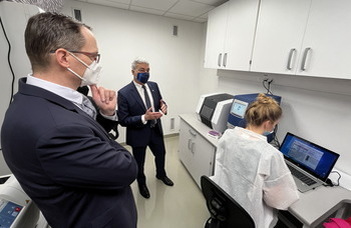The ultramodern COVID laboratories of ELTE Faculty of Science are handed over
The laboratory was established by the ELTE Biotechnology Centre for University-Industry Cooperation (Felsőoktatási és Ipari Együttműködési Központ, FIEK) within the framework of the project entitled “Establishment of a Molecular Biomarker Research and Service Centre to Meet Industrial Demands” funded by the National Research, Development and Innovation Office. In this project, the partner institutes of our university were the Research Centre for Natural Sciences at the Eötvös Loránd Research Network, the Servier Research Institute for Medical Chemistry Inc., and the CRU Hungary Healthcare Services Ltd.
The FIEK project launched in 2017 with the support of the National Fund for Research, Development and Innovation (Nemzeti Kutatási Fejlesztési és Innovációs Alap, NKFIA), was originally aimed at establishing an accredited molecular biomarker laboratory carrying out investigations in genetics and cell biology for the pharmaceutical industry and the national healthcare system. However, in response to the pandemic that broke out in late 2019, the consortium broadened the original development concept and started to transform the new facility to be suitable for curbing the Covid-19 epidemic.
As a result of the work, the recently completed laboratory covering over 440 square metres uses qPCR and LAMP technologies
to test for the presence of SARS-CoV-2 in biological samples and detect SARS-CoV-2 specific antibodies.
Using ELISA tests and analysing of the neutralising effects of other serum antibodies, it is also possible to study the cellular immune response. The laboratory offers continuous and safe health control for ELTE faculty members and students, and the interested public. In addition, it is suitable for conducting molecular biomarker research and providing related services in line with the original objectives. The laboratory is expected to start operating in mid-February 2022.
“The laboratory is an important milestone in the life of the University. Due to the pandemic, it was also necessary to restructure the priorities in certain areas of science and identify those fields where researchers could use their knowledge and resources in service of the fight against the pandemic. It is our particular pleasure that Professor Imre Kacskovics and his colleagues have made the laboratory suitable for playing a major role in the fight against the coronavirus disease. When the epidemic is over, the laboratory will continue to serve the needs of biotechnology research and health protection for ELTE citizens,” emphasised László Borhy, Rector of Eötvös Loránd University, at the ceremony.

“It is our ambition to become a major innovator in Europe by 2030, which requires meticulous building work, academic knowledge and result-oriented developments in close collaboration with companies. The success of construction requires, on the one hand, a change in culture and, on the other hand, dedicated, diligent attitude on the part of individuals within the institutional system. Now we are attending the handover ceremony of a great infrastructure where both requirements are fulfilled,” said Tibor Gulyás, Deputy Secretary of State for Innovation.
The implementation of the ELTE Biotechnology FIEK is yet another example of the efficient, goal-oriented use of funds offered by the National Research, Development and Innovation Office. It is a special merit of the centre’s leaders and researchers that they realised the risks of an emerging pandemic in late 2019, and they re-evaluated and expanded the areas of operation at the centre accordingly. The modification of the scope of ELTE Biotechnology FIEK helps local actions taken against the pandemic already in its third year due to the centre’s specialists, biotechnology services, and high-level know-how. Furthermore, it
makes ELTE Biotechnology FIEK more prepared to deal with similar potential epidemics that are likely to strike in the future,
emphasised István Szabó, vice-president for science and international affairs of the National Research, Development and Innovation Office.
“Our primary goal is the effective management of the current pandemic is in order to create a safe environment for our faculty and students, as well as for every ELTE citizen. In the future, there will be a great need for laboratory diagnostic capacity based on biotechnology, that will allow us to create a significant part of the required reagents ourselves, devise new methods, or quickly adopt diagnostic solutions developed and published at the leading universities of the world,” said Imre Kacskovics, immunologist, Dean of the ELTE Faculty of Science in his speech.

